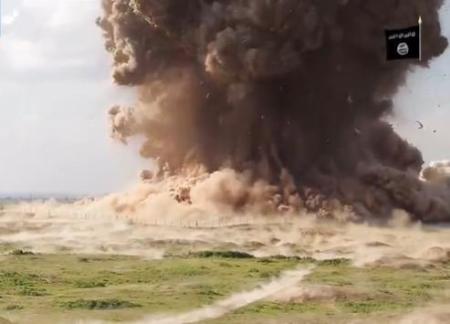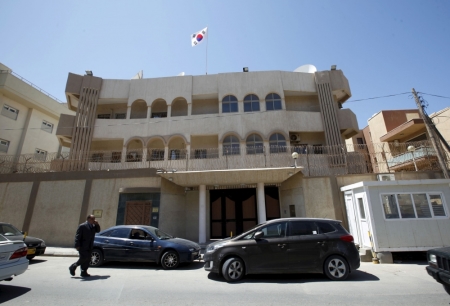ISIS Destroys Biblical City of Calah, Claims Responsibility for Attack on South Korean Embassy in Libya
Visit NBCNews.com for breaking news, world news, and news about the economy
The Islamic State terrorist group has released a video that shows militants completely destroying the biblical city of Calah, which became known in modern times as the ancient Assyrian city of Nimrud in Northern Iraq.
The 7-minute video, released Saturday night by ISIS' media wing, shows militants using sledgehammers, drills, circular power saws, jackhammers and a bulldozer to destroy ancient sculptures, shrines and ruins that are believed to be at least 3,000 years old. Afterwards, the militants stuffed and set up barrel bombs that were used to blow up the entire historical site in three different massive explosions.
Nimrud, which is about 22 miles south of the ISIS stronghold of Mosul near the banks of the Tigris river, is believed to date back as far as 13th century B.C. and was mentioned in Genesis 10:11 by its former name of Calah alongside the heroic hunter Nimrod, who was a great grandchild of Noah.

The town also served as the capital of the Neo-Assyrian empire under the rule of King Ashurnasirpal II.
The assault on the town, which occurred in early March, has been ruled a war crime by United Nations Secretary General Ban Ki-Moon.
"In a new crime in their series of reckless offenses, they assaulted the ancient city of Nimrud and bulldozed it with heavy machinery, appropriating archaeological attractions dating back 13 centuries B.C.," a statement from the United Nations Educational, Scientific and Cultural Organization reads.
As the Islamic State continues on its rampage of destroying ancient artifacts, churches, and towns in Iraq and Syria, the Daily Mail reports that a militant in the recently released video justifies the Islamic State's destruction of historical landmarks by stating that the group has been called by God to commit such acts.
"God has honored us in the Islamic State to remove all of these idols and statues worshipped instead of Allah in the past days," the militant says.
UNESCO Director General Irina Bokova told the Daily Mail that "nothing is safe" in Iraq from the wrath the Islamic State.
"This is yet another attack against the Iraqi people, reminding us that nothing is safe from the cultural cleansing under way in the country: it targets human lives, minorities, and is marked by the systematic destruction of humanity's ancient heritage," Bokova said.
ISIS' video release wasn't the group's only headline from the weekend, as militants believed to be associated with the Islamic State's affiliate in Libya attacked the South Korean embassy in the Libyan capital of Tripoli on Sunday.
Seoul's foreign ministry confirmed the attack and an official told AFP that two Libyan security officers were killed in the exchange, while another was wounded. The official added that there were only three South Korean nationals working in the embassy at the time of the attack. None of the South Koreans were hurt in the incident.
"We don't not know whether the attack targeted the embassy or the Libyan [security] officers," the Seoul foreign ministry official said.
According to an AFP photographer, it appeared as though the militants opened fire on the car that the security officials were in, while the main embassy building was not struck.
Even though there was no confirmation on the identities of the gunmen, ISIS has claimed responsibility for the confrontation, SITE Intelligence Group reported.
"The Soldiers of the Caliphate in the city of Tripoli killed two of the guards at the South Korean embassy," SITE quoted an ISIS tweet as stating.
ISIS affiliates were also active in Egypt on Sunday, killing at least 14 people in two separate incidents, with the majority of them believed to be Egyptian police officers or soldiers.
The largest of the attacks occurred at a police station in the town of el-Arish. A bomb was detonated at the front gate of the police station in the town and eight people were killed, while 45 others were injured.
The second incident was a roadside bombing targeted an armored vehicle, killing six Egyptian soldiers. Another roadside bomb injured an additional three soldiers.
According to AFP, the attacks have been claimed by the Sinai-based militant group Ansar Bayt al-Maqdis, which is now the Egyptian ISIS affiliate.
"An armored personnel carrier for the army of the apostates was destroyed ... killing and wounding all aboard," Ansar Bayt al-Madqis posted on an affiliated Twitter account.























